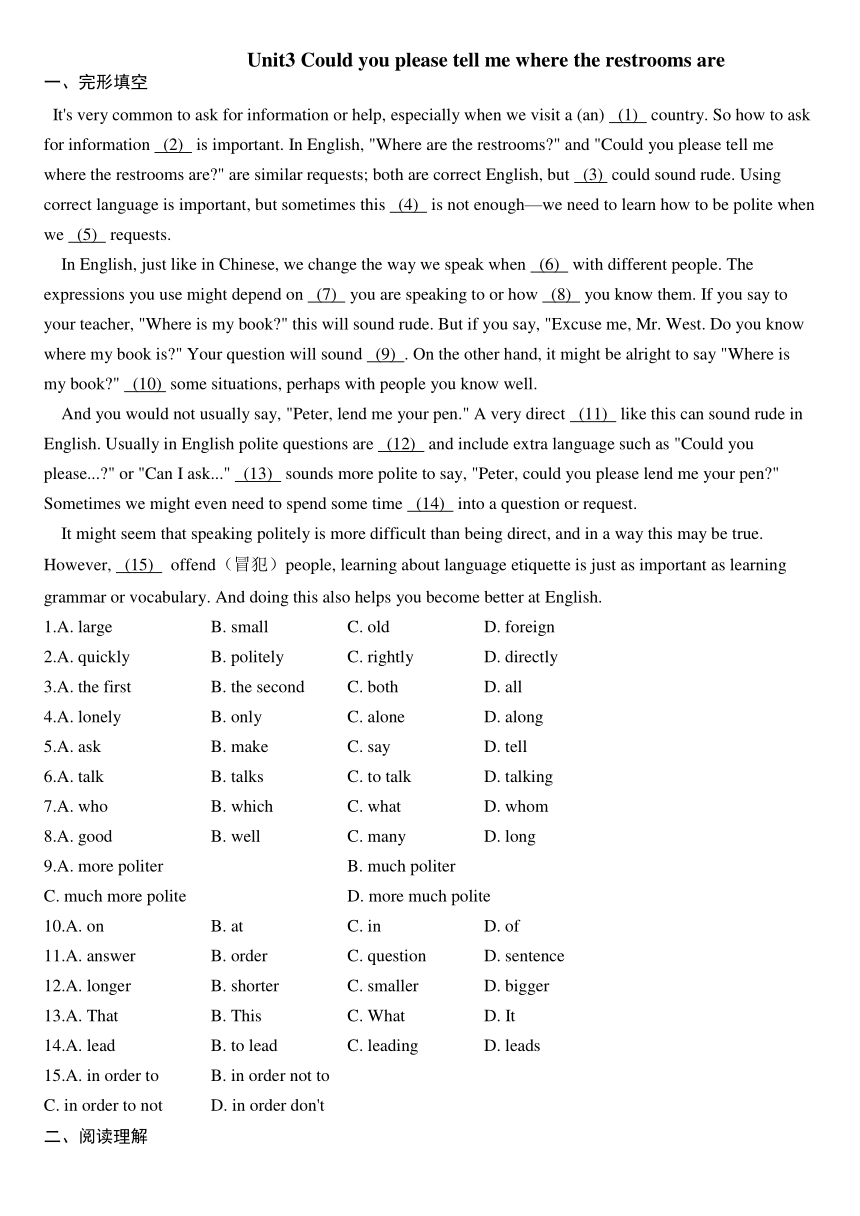
Unit3 Could you please tell me where the restrooms are 一、完形填空 It's very common to ask for information or help, especially when we visit a (an) (1) country. So how to ask for information (2) is important. In English, "Where are the restrooms " and "Could you please tell me where the restrooms are " are similar requests; both are correct English, but (3) could sound rude. Using correct language is important, but sometimes this (4) is not enough—we need to learn how to be polite when we (5) requests. In English, just like in Chinese, we change the way we speak when (6) with different people. The expressions you use might depend on (7) you are speaking to or how (8) you know them. If you say to your teacher, "Where is my book " this will sound rude. But if you say, "Excuse me, Mr. West. Do you know where my book is " Your question will sound (9) . On the other hand, it might be alright to say "Where is my book " (10) some situations, perhaps with people you know well. And you would not usually say, "Peter, lend me your pen." A very direct (11) like this can sound rude in English. Usually in English polite questions are (12) and include extra language such as "Could you please... " or "Can I ask..." (13) sounds more polite to say, "Peter, could you please lend me your pen " Sometimes we might even need to spend some time (14) into a question or request. It might seem that speaking politely is more difficult than being direct, and in a way this may be true. However, (15) offend(冒犯)people, learning about language etiquette is just as important as learning grammar or vocabulary. And doing this also helps you become better at English. 1.A. large B. small C. old D. foreign 2.A. quickly B. politely C. rightly D. directly 3.A. the first B. the second C. both D. all 4.A. lonely B. only C. alone D. along 5.A. ask B. make C. say D. tell 6.A. talk B. talks C. to talk D. talking 7.A. who B. which C. what D. whom 8.A. good B. well C. many D. long 9.A. more politer B. much politer C. much more polite D. more much polite 10.A. on B. at C. in D. of 11.A. answer B. order C. question D. sentence 12.A. longer B. shorter C. smaller D. bigger 13.A. That B. This C. What D. It 14.A. lead B. to lead C. leading D. leads 15.A. in order to B. in order not to C. in order to not D. in order don't 二、阅读理解 A Ferdinand Magellan (1480-1521)was a Portuguese explorer, In 1519, he led the first voyage to sail around the world. It was also the first voyage to sail from the Atlantic Ocean to the Pacific Ocean. Magellan gave the Pacific Ocean its name, which means "peaceful sea" in Portuguese. However, Magellan himself was killed in a battle before the voyage was finished. Only one of his ships, the Victoria, completed the journey. Laozi lived in the 6th century BC. It is believed that he wrote the Daodejing. This book is popular in both the East and the West, and it is still widely read today. Many people have found inspiration (鼓舞人心的话) in this book. There are ma ... ...
~~ 您好,已阅读到文档的结尾了 ~~